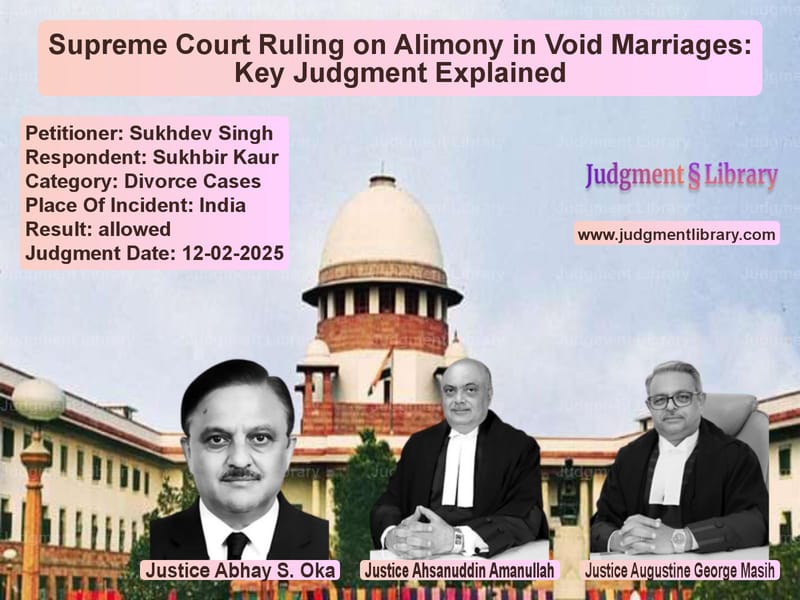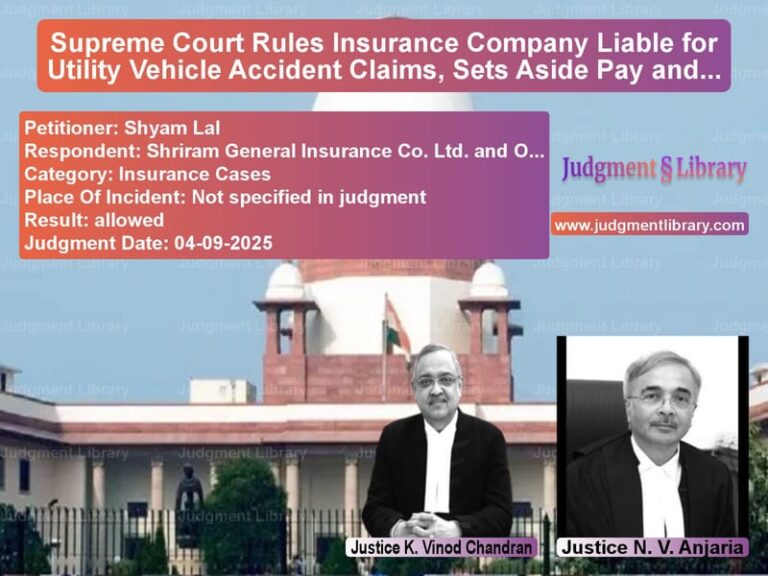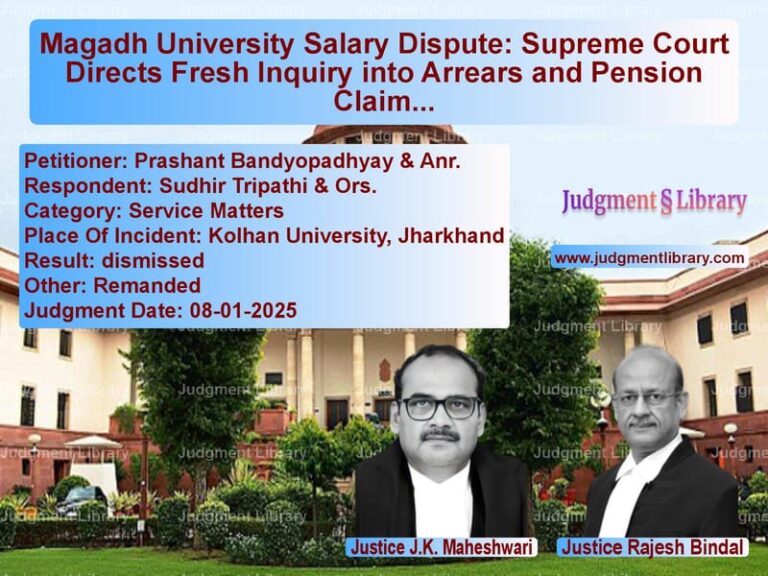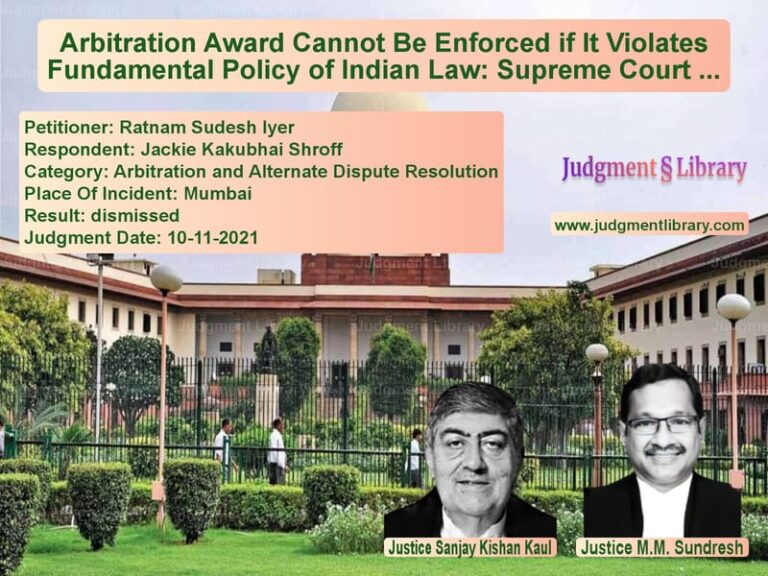Supreme Court Ruling on Alimony in Void Marriages: Key Judgment Explained
The Supreme Court of India recently delivered a landmark ruling in the case of Sukhdev Singh v. Sukhbir Kaur, addressing the issue of whether a spouse from a marriage declared void under the Hindu Marriage Act, 1955 is entitled to claim alimony and maintenance. This judgment clarifies the interpretation of Sections 24 and 25 of the Act, resolving conflicting judicial precedents on the matter.
Background of the Case
The dispute arose when the appellant, Sukhdev Singh, challenged a lower court’s order granting permanent alimony to his estranged spouse, Sukhbir Kaur, despite their marriage being declared void. The case was referred to a three-judge bench due to conflicting rulings from previous cases on whether alimony could be granted when a marriage was legally invalid.
The core issue revolved around the interpretation of Section 24 (maintenance pendente lite) and Section 25 (permanent alimony and maintenance) of the Hindu Marriage Act, 1955. The question was whether these provisions applied to cases where a marriage was declared null and void under Section 11 of the Act.
Key Legal Provisions Considered
- Section 5: Outlines the conditions for a valid Hindu marriage.
- Section 11: Declares certain marriages as void if they violate conditions under Section 5 (such as bigamy or prohibited relationships).
- Section 24: Provides for maintenance during the pendency of matrimonial proceedings if a spouse lacks independent means of support.
- Section 25: Grants courts the power to award permanent alimony or maintenance at the time of or after the passing of a decree under the Act.
Petitioner’s Arguments
The appellant, Sukhdev Singh, contended:
- A void marriage is legally non-existent, and the concept of alimony should not apply.
- Granting maintenance in a void marriage contradicts the objective of the Hindu Marriage Act, which seeks to prevent illegal unions.
- Courts cannot extend benefits to individuals who entered into a void marriage knowingly.
- Earlier cases such as Yamunabai Anantrao Adhav v. Anantrao Shivram Adhav (1988) held that a spouse from a void marriage could not claim maintenance.
Respondent’s Arguments
The respondent, Sukhbir Kaur, argued:
- The law should not punish financially dependent spouses for unknowingly entering into a void marriage.
- Section 25 uses the term “any decree,” which includes decrees declaring a marriage void.
- Judgments such as Chand Dhawan v. Jawaharlal Dhawan (1993) supported granting maintenance even when a marriage was nullified.
- Article 15(3) of the Constitution allows special provisions for women, justifying the grant of alimony.
Supreme Court’s Observations and Ruling
After a detailed analysis of conflicting precedents, the Court held:
Key observations by the Court:
- “A spouse of a marriage declared void is entitled to seek permanent alimony or maintenance from the other spouse by invoking Section 25 of the Hindu Marriage Act.”
- “Whether such relief should be granted depends on the facts of each case, including the conduct of the parties.”
- “The expression ‘any decree’ under Section 25 includes decrees of nullity under Section 11.”
- “Granting maintenance in void marriages does not encourage illegal relationships but prevents financial destitution.”
Final Judgment
The Supreme Court ruled:
- A spouse from a void marriage can claim alimony under Section 25.
- Courts retain discretion based on factors such as financial dependency and good faith.
- Section 24 applies even if the marriage is later declared void, allowing interim maintenance during proceedings.
Impact of the Judgment
This ruling has far-reaching implications for family law:
- Ensures financial security for individuals unaware of their marriage’s invalidity.
- Clarifies the scope of Sections 24 and 25 in cases of void marriages.
- Establishes that courts have discretion in awarding alimony based on case-specific circumstances.
- Encourages a balanced approach to protect vulnerable spouses while upholding legal principles.
The judgment is expected to guide future cases involving maintenance claims arising from void marriages, ensuring fairness and legal clarity.
Petitioner Name: Sukhdev Singh.Respondent Name: Sukhbir Kaur.Judgment By: Justice Abhay S. Oka, Justice Ahsanuddin Amanullah, Justice Augustine George Masih.Place Of Incident: India.Judgment Date: 12-02-2025.
Don’t miss out on the full details! Download the complete judgment in PDF format below and gain valuable insights instantly!
Download Judgment: sukhdev-singh-vs-sukhbir-kaur-supreme-court-of-india-judgment-dated-12-02-2025.pdf
Directly Download Judgment: Directly download this Judgment
See all petitions in Alimony and Maintenance
See all petitions in Divorce by Desertion
See all petitions in Judgment by Abhay S. Oka
See all petitions in Judgment by Ahsanuddin Amanullah
See all petitions in Judgment by Augustine George Masih
See all petitions in allowed
See all petitions in supreme court of India judgments February 2025
See all petitions in 2025 judgments
See all posts in Divorce Cases Category
See all allowed petitions in Divorce Cases Category
See all Dismissed petitions in Divorce Cases Category
See all partially allowed petitions in Divorce Cases Category







